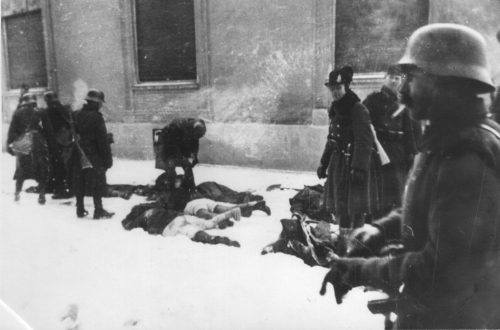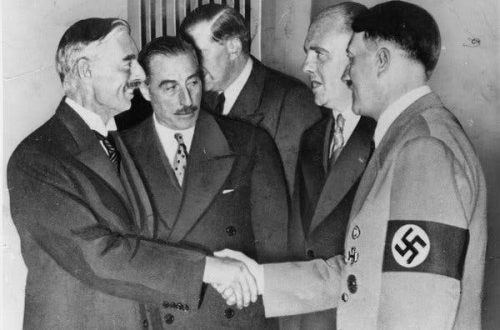The Communist genocide in Cambodia was thoroughly exposed in 1977 by two books: John Barron and Anthony Paul’s, Peace With Horror: The Untold Story of Communist Genocide in Cambodia (Published in the U.S. with the title, Murder of a Gentle Land,) and François Ponchaud’s, Cambodge Année Zéro. (The latter was subsequently published in English as, Cambodia Year Zero).
Barron and Paul concluded (p.206) that “at the very minimum more than 1,200,000 men, woman and children died in Cambodia between April 18, 1975 and January 1, 1977.” The book was documented with 24 pages (pp.211-234) of acknowledgements, chapter notes and further readings. In his preface, John Barron argued, “the documentation conclusively shows that cataclysmic events have occurred in Cambodia and that their occurrence is not subject to rational dispute.”
François Ponchaud reported similar cases of horror in Cambodia to Barron and Paul. Ponchaud admits (p.13) that in the beginning he was “not opposed to the Khmer revolution.” He changed his mind, because by the time he wrote the book, he felt (p.16) that the Cambodian revolution was “A terrifying one, for all who have any respect for human beings.”
Jean Lacouture reviewed the French edition of Ponchaud’s book for the New York Review of Books (March 31, 1977 and corrections May 26, 1977). He believed “Cambodge, année zero is by far the best informed report to appear on the new Cambodia, the most tightly locked up country in the world, where the bloodiest revolution in history is now taking place.” He stated “François Ponchaud’s book can be read only with shame by those of us who supported the Khmer Rouge cause” and concluded:
When men who talk of Marxism are able to say, as one quoted by Ponchaud does, that only 1.5 or 2 million young Cambodians, out of 6 million, will be enough to rebuild a pure society, one can no longer simply speak of barbarism; what barbarians have ever acted in this way? Here is only madness.
I have previously written (“Malcolm Caldwell: Pol Pot’s Apologist,” [pdf] Democratiya 16, Spring/Summer 2009) about Malcolm Caldwell’s history. Prior to championing Pol Pot’s genocidal regime, Caldwell had staged an event to raise money for “the purchase of arms” by the Vietcong for use in “their heroic resistance to foreign military aggression.”
In 1972, jointly with Lek Tan, Caldwell wrote the book, Cambodia in the Southeast Asian War. This book was dedicated to:
the revolutionary masses of the world, in the hope that it will contribute, in however small a way to the ultimate defeat of American imperialism, and thus to opening for all of us – in the West as in the East – the prospect of a better, fuller, and more human and humane life.
Milton Osborne reviewed this travesty in Pacific Affairs (Autumn 1973). He noted the “consistent bias” in the way facts were presented. None of this stopped Noam Chomsky writing the preface.
In 1976, George C. Hildebrand and Gareth Porter’s book, Cambodia: Starvation and Revolution was published. They viewed that the decision of the Khmer Rouge to remove the population of Cambodia from the cities was justified. The book contained photographs of happy peasants and workers in Cambodia. They argued (p.56):
What was portrayed as a destructive backward-looking policy motivated by doctrinaire hatred was actually a rationally conceived strategy for dealing with the problems that faced postwar Cambodia.
Donald W. Beachler (“Arguing about Cambodia: Genocide and Political Interest,” Holocaust and Genocide Studies [Fall 2009] p. 218), was not impressed: “One could come away from [Hildebrand and Porter’s] book with the impression of Cambodia as a fledgling liberal democracy.”
Malcolm Caldwell had a different opinion. He commenced a review for the radical journal Race & Class (Vol. 18, 1977), with the words, “This brief but powerfully argued and moving book deserves the warmest of welcomes.” He enthused about Hildebrand and Porter’s “valuable” book and concluded:
“No doubt many Race & Class readers find themselves from time to time in argument about Kampuchea. Maybe, until now, most have found themselves unsure of their grounds in defending the new revolutionary government from slander. This new volume should prove invaluable to all such. And it should be given the widest possible distribution: if each of us makes sure it is ordered for his or her local library, that will be an excellent start, for it won’t lie idle on the shelves and might thereby reach a surprisingly large and hitherto hostile or indifferent audience. Go to it.
It can also be noted that both Caldwell and Tan’s, Cambodian in the Southeast Asian War and Hildebrand and Porter’s volume were published by Monthly Review Press. Paul Bogdanor had brought to my attention that as well as publishing a book highly sympathetic to the Khmer Rouge, Monthly Review has, for decades, been championing Mao Zedong. Articles that it has published in recent years include those entitled, “Did Mao Really Kill Millions in the Great Leap Forward?” and “What Maoism Has Contributed.” This is away from its defence of the Milosevic regime and regular commentary by Fidel Castro.
Noam Chomsky and Edward Herman wrote a notorious review of the books by Barron and Paul, Ponchaud and Hildebrand and Porter, (“Distortions at Fourth Hand,” The Nation, June 25, 1977). It was here that they argued that Hildebrand and Porter’s book was a “carefully documented study of the destructive American impact on Cambodia and the success of the Cambodian revolutionaries in overcoming it . . . based on a wide range of sources.”
James Donald totally demolished this review. He checked every citation and published his results. He concluded:
Every citation was a lie in the sense that the material cited failed to support the conclusions that Chomsky leads the reader to believe it proves. In some cases the material cited supported similar but far weaker conclusions, in most cases the opposite – the material cited is evidence for the opposite of what Chomsky leads the reader to believe.
Herman and Chomsky expanded their thesis in their book, After the Cataclysm: Postwar Indochina and the Reconstruction of Imperial Ideology, published by South End Press in 1979. It was here (p.146) that they approvingly cited a report that suggested that the reason many refugees had fled Cambodia was because they “disliked the rigorous working life” that the communists, who had taken over Cambodia, had insisted upon.
This was not all from Chomsky. Donald Beachler (op. cit., p.223) notes:
Examining materials in the Documentation Center of Cambodia archives, American commentator Peter Maguire found that Chomsky wrote to publishers such as Robert Silver of the New York Review of Books to urge discounting atrocity stories. Maguire reports that some of these letters were as long as twenty pages, and that they were even sharper in tone than Chomsky’s published words.
As has previously been mentioned on this blog, last week, (January 10, 2010), The Observer published a fine piece of journalism by Andrew Anthony “Lost in Cambodia” about Malcolm Caldwell. Yesterday, (January 17, 2010), The Observer published a letter from Noam Chomsky in response to Anthony’s article. Oliver Kamm, writing in his blog for The Times, sums up Chomsky’s position fairly: “Never apologise, never explain.”
In his shameful posthumously published essay, “Cambodia: Rationale for a Rural Policy,” (published in 1979 in Bob Hering and Ernst Utrecht [eds.] Malcolm Caldwell’s South-East Asia South East Asian Monograph Series Number 5, Townsville, Australia: Committee of South-East Asian Studies, James Cook University of North Queensland pp. 26-103), Caldwell argued (p.103):
Others ought to and may well seek to emulate the policies that emanated from Democratic Kampuchea.
He went on to say:
I do not think there can be much doubt that when time has lent perspective to our view, the Kampuchean Revolution will appear more and more clearly as one of the significant and early indications of the greatest and necessary change beginning to convulse the world in the later 20th century and to shift it from a disaster-bound course to one holding out promise of a better future for all.
After Caldwell was murdered, Noam Chomsky (Malcolm Caldwell 1931-1978: A Tribute and a bibliography, [Spokesman, 1979] p.60), wrote:
Malcolm Caldwell was a fine scholar, whose work was distinguished by integrity and compassion. With hindsight and sympathy, he tried to bring us an awareness of how our own privilege was founded on the suffering and oppression of the great majority of the world’s population. More specifically, his work reflected his deep concern with the peasant societies of Southeast Asia, their fate, their aspirations, the forces that kept them in bondage and their prospects for a brighter future through social revolution…. There can be no more fitting memorial to Malcolm and no more proper punishment for his assassins than the willingness of others to take on the tasks that he confronted.
With his latest missive to The Observer, where he continues to defend both his own 1977 review essay in The Nation and Hildebrand and Porter’s book, it appears that Chomsky has continued to be willing “to take on the tasks” that Caldwell “confronted.”


